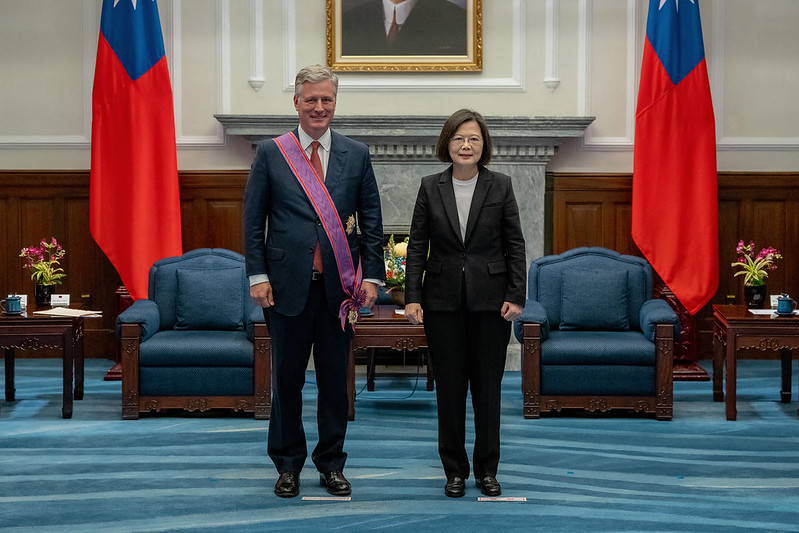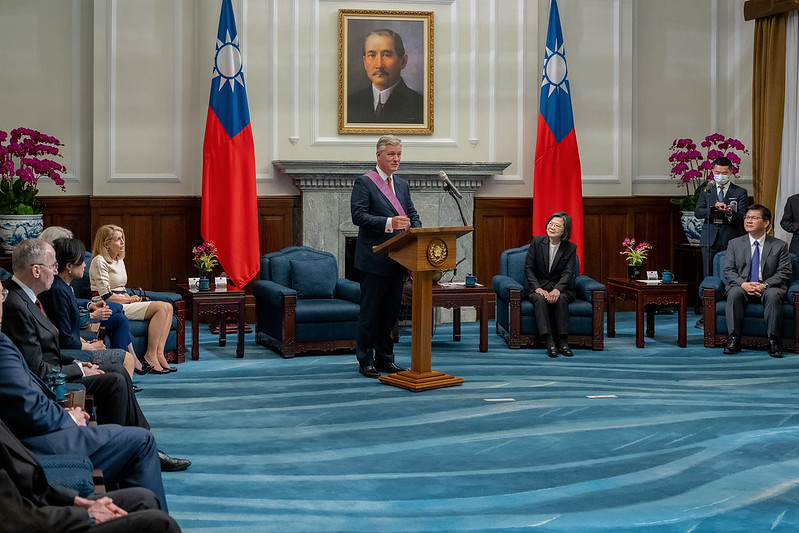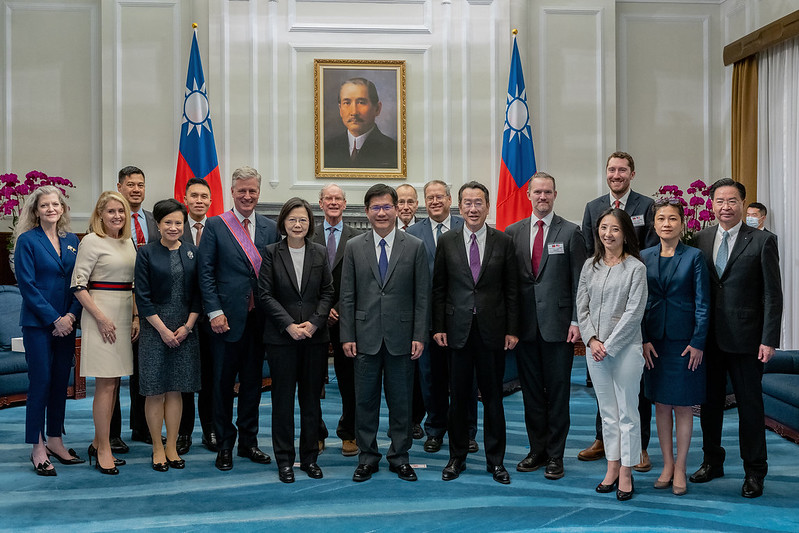News & activities
 News releases
News releases
On the afternoon of March 21, President Tsai Ing-wen presented United States Ambassador Robert O'Brien, former White House national security advisor, with the Order of Brilliant Star with Special Grand Cordon, in recognition of his contributions to Taiwan-US relations. In remarks, President Tsai said that interactions between Taiwan and the US have grown closer than ever in recent years. She noted that we have continued to create even more niches for economic and trade ties to flourish and that we are striving together to advance prosperity and development in the Indo-Pacific region. President Tsai also thanked the US for paying close attention to issues concerning Taiwan's security, and said that we anticipate that Taiwan and the US can continue to deepen our partnership through security cooperation and economic and trade exchanges.
A translation of President Tsai's remarks follows:
I welcome Ambassador O'Brien as he leads this delegation to Taiwan. Our distinguished guests have all been good friends of Taiwan for many years. They continue to pay close attention to Taiwan-related issues from their different roles. I want to thank you all for making this trip, which demonstrates bipartisan US support for Taiwan.
During his time at the White House as US national security advisor, Ambassador O'Brien successfully promoted visits to Taiwan by members of the US Cabinet. He also oversaw the declassification of the Six Assurances and the strengthening of Taiwan-US economic and trade cooperation. These were important milestones in advancing Taiwan-US relations.
Today, by presenting Ambassador O'Brien with the Order of Brilliant Star with Special Grand Cordon, we recognize his many contributions to Taiwan-US relations. On behalf of the people of Taiwan, I want to extend our most sincere gratitude.
The Global Taiwan Institute (GTI) is the first and only Washington-based think tank dedicated exclusively to exploring Taiwan-US affairs. This trip to Taiwan by the GTI Task Force on US-Taiwan Relations demonstrates more than ever the crucial role that the institute plays in Taiwan-US exchanges.
In recent years, interactions between Taiwan and the US have grown closer than ever. In addition to actively promoting the Taiwan-US Initiative on 21st-Century Trade, we have continued to create even more niches for economic and trade ties to flourish, including such mechanisms as the Economic Prosperity Partnership Dialogue (EPPD) and Trade and Investment Framework Agreement (TIFA). Together, we are striving to advance prosperity and development in the Indo-Pacific region.
We also thank the US for paying close attention to issues concerning Taiwan's security. In the face of expanding authoritarianism, democratic partners must stand even more united, jointly safeguarding regional peace and stability. Ambassador O'Brien frequently cites President Reagan's maxim of "peace through strength." We profoundly agree with this sentiment.
Indeed, in recent years, Taiwan has increased its national defense budget and enhanced its asymmetric warfare capabilities. In addition to establishing the All-Out Defense Mobilization Agency to integrate reserve and civil defense resources, we are drawing on the strengths of multiple government ministries and agencies to combat disinformation and hybrid warfare.
Also, starting from next year, Taiwan is reinstating a one-year term of mandatory military service. This will enhance our self-defense capabilities and demonstrates our determination to safeguard democracy. Through all of these efforts, we are implementing the idea that peace depends on national defense, and national defense depends on the people of Taiwan.
Looking ahead, we anticipate that Taiwan and the US can continue to deepen our partnership through security cooperation and economic and trade exchanges. In closing, I once again thank you all for your visit. I very much look forward to hearing and discussing your insights in just a few moments. I wish you all a fruitful and pleasant trip.
Ambassador O'Brien then delivered remarks, a transcript of which follows:
Thank you, Madam President, Excellencies. I am deeply humbled to receive the Order of Brilliant Star with Special Grand Cordon. It is an incredible honor for me and for my entire family. Your government, Madam President, has rolled out the red carpet for our delegation. Foreign Minister [Joseph] Wu (吳釗燮), my good friend; Ambassador Bi-khim [Hsiao] (蕭美琴) in Washington; and the entire ministry of foreign affairs and your government have provided us with extraordinary support. And the hospitality here is unmatched. I have traveled around the world many times to many countries, and the hospitality extended by Taiwan is amazing, Madam President, thank you. And that is on behalf of the entire delegation.
So, our delegation is combined with ambassadors, generals, experts, former executive office officials, and we are here in Taiwan to listen. Our work will culminate in a report that will be published this summer that will focus on how we can improve the already good relationship between Taiwan, the Republic of China, and the United States of America. And our countries maintain a strong relationship, but it is a long relationship. It goes back to even before modern times, the modern relationship, to the Churchill, Roosevelt, Chiang Kai-shek summit in World War II that resulted in the Cairo Declaration. And that relationship continues to grow stronger even today.
As you kindly mentioned, Madam President, at the NSC we sought to improve the relationship between Taiwan and the United States and to promote a free and open Indo Pacific that our good friend Prime Minister [Shinzo] Abe, Abe-san, talked about, and gave us that term. And we had a great team working on that at the NSC: Alex Gray, Matthew Pottinger, and Allison Hooker and Ivan Kanapathy, both of whom are here today, and many others, and they share in this recognition.
Madam President, you kindly noted some of the things that we did to bolster the relationship, and I will not repeat those, but I will also mention that we got $18 billion in arms sales approved for Taiwan, including harpoon anti-ship missiles and Stinger anti-aircraft missiles, among many other systems. And we need to get those systems delivered now and not wait for them. And I am happy to say that in important ways, my successor Jake Sullivan, the current American national security advisor, and the Biden administration are following through on many of the policies that we started.
And Madam President, I want to thank you for something personal that happened at the outset of COVID, and Foreign Minister Wu as well. At the outset of the pandemic, we didn't have enough PPE in America – it was being used at hospitals and medical facilities, but we needed PPE and facemasks in the White House and we had nowhere to get it. And then a shipment came in from Taiwan. And we were able to put the men and women who work in the White House Situation Room on our crowded watch floor, we were able to give them masks, and help to give the First Family masks. They all said "Made in Taiwan" on them. And we appreciated that very generous thing that you did to help us do our job safely at a time when we did not want to take our own PPE away from the medical professionals. So, thank you, Madam President. That meant a lot to us.
So, Taiwan is a shining example of what democracy, the rule of law, and individual liberty can mean to a country. But unfortunately, as you pointed out, Madam President, there are autocracies and totalitarian regimes around the world that do not value those same principles of freedom that we believe in.
But we know, as you pointed out, Madam President, that a strong defense deters aggression. Thus, I am pleased to see that Taiwan is spending more on its security, and, as you pointed out, is lengthening the conscription enlistment term, and is deploying anti-access/area denial platforms, asymmetric platforms, that will turn Taiwan into a porcupine and make it stronger and safer. Now, should aggression take place by a totalitarian regime against Taiwan – and it is our hope and our prayer that it never does, I want you to know that I believe that the United States will stand with Taiwan. Now, President [Donald] Trump made this very clear to his counterparts, and President [Joe] Biden had said four times publicly that if Taiwan is attacked, America will stand by Taiwan.
For Lo-Mari [O'Brien] and me this is personal, because our two daughters both serve as young officers in the United States Armed Forces. So, we know that that commitment has special meaning for us as parents of soldiers and airmen and for many American families. And let me be very clear, because I want to make this statement so that those who would twist our words and engage in propaganda and misinformation cannot do so. America is not attempting to change the status quo with respect to Taiwan, not President Trump, not President Biden. Madam President, what America and its partners have made clear is that the world will not go back to a century or more ago, when a large neighbor could invade its smaller neighbor for glory, or for territorial expansion, or for economic gain. In the not too distant past, we watched Saddam Hussein's Iraq invade Kuwait; we watched the Junta in Argentina invade the Falklands; and sadly, more recently, we've watched Putin's Russia invade Ukraine.
But Madam President, what we know is that those wars did not work out very well for the first two regimes. The Junta and Saddam are in the dustbin of history. And it is not going to work out well for Vladimir Putin either. Putin's ambitions have led to muddy fields full of dead young Russian soldiers, a degraded Russian military, Moscow having to go hat in hand to the Iranians, to Tehran, for weapons, and all while its economy has been cut off from the West. And for those who would think that countries of the West and the free world would stand idly by, that invasion led to an expansion of NATO with Sweden and Finland that no one expected. Now, Russia is even at risk of becoming a vassal state to its eastern neighbor. And I expect the 1860 Treaty of Peking will be renegotiated by the Secretary General of the Communist Party of China, and at Russia's expense.
So Ukrainians inspire us with their bravery and their determination in defending their homes. But I believe that the people of Taiwan would do the exact same thing if they faced similar circumstances.
Now, Madam President, you know this: the United States and Taiwan want peace; and we pray for peace in this beautiful region. Peace results in the free flow of commerce and culture and prosperity and in friendship. But our adversaries must know that we will never exchange our freedom, our principles, our values, and sacrifice them in exchange for peace. Instead, we will secure peace through our strength. Again, Madam President, you have done me a high honor by bestowing this award, on behalf of Taiwan, to me. Thank you very much. May God bless you. May God bless the Republic of China (Taiwan). And may God bless the United States of America.
Also in attendance at the ceremony were Mr. O'Brien's wife Mrs. Lo-Mari O'Brien, former Deputy Assistant to the President and Senior Director for Asian Affairs at the White House National Security Council and GTI Bipartisan Task Force on US-Taiwan Relations Deputy Chair Allison Hooker, and GTI Chair of the Board of Directors Jennifer Hu.












